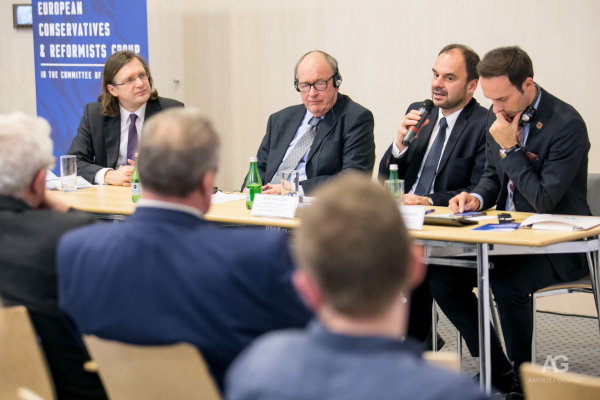EU environmental policy: Offering local solutions to global problems

On 23 November, the ECR Group in the CoR held a conference dedicated to the role local and regional stakeholders play in global climate change negotiations, the bioeconomy and the circular economy. The conference was held in Toruń, Poland, at the invitation of the president of the ECR Group in the CoR, Rob Jonkman, and ECR Group members from Poland.
Speaking about ways to improve sustainability in the EU, ECR Group member Paweł Grzybowski (Mayor of Rypin in Kujawsko-Pomorskie, Poland) said: "We need better regulations, better education for citizens and more investment in new technologies. Out of these three measures education is cheapest and most effective, but it requires strategic planning and does not bring immediate results".
During the first panel, Mr Grzybowski debriefed participants about his participation in the international climate change negotiations in Marrakesh (COP22), which took place last year. This year's climate change conference, COP23, was held in the German city of Bonn. Commenting on its outcomes, ECR Group vice-president Adam Banaszak stated: "It is promising to see that every year the role of local and regional politicians in these meetings has been increasing. As we are the level closest to the people and we know our areas best, we know what works on the ground and what targets are realistic to achieve." Mr Banaszak also reminded participants that the next COP will take place in the Polish city of Katowice, the capital of the industrial Silesia region, which will provide a good opportunity to discuss clean energy technologies, including the ones for fossil fuels.
Speaking about the bioeconomy, Michał Korolko, chair of the Europa Kujaw i Pomorza regional association, used a practical example from the region of Kujawsko-Pomorskie: "In Bydgoszcz there are private companies which re-use the ash from burning waste. They use it in the construction sector. There are not many enterprises like that in Poland but we are trying to encourage them to invest in innovative bioeconomy projects, which are among EU's priorities. We expect that after 2020, structural funds will continue to be invested in the bioeconomy so the private sector may expect a degree of stability and predictability".
Prof. Daniela Szymańska from the Nicolaus Copernicus University added that "there is no alternative to the bioeconomy for local communities". This is because we have limited natural resources which will need to be replaced with new ones. "Key to this process is education. We need to convince people and businesses that the bioeconomy is not something difficult to implement. The bioeconomy is not an entirely new idea. For instance, composting as a recognised practice dates back to the early Roman Empire".
Among the participants at the conference were politicians, researchers, representatives of non-governmental organisations, and students from the Kujawsko-Pomorskie region. The speakers also included Alderman Gordon Keymer (honorary president of the ECR Group) and Emanuele Monti (councillor in Lombardy) who shared best practices from the United Kingdom and Italy in the area of the circular economy.

